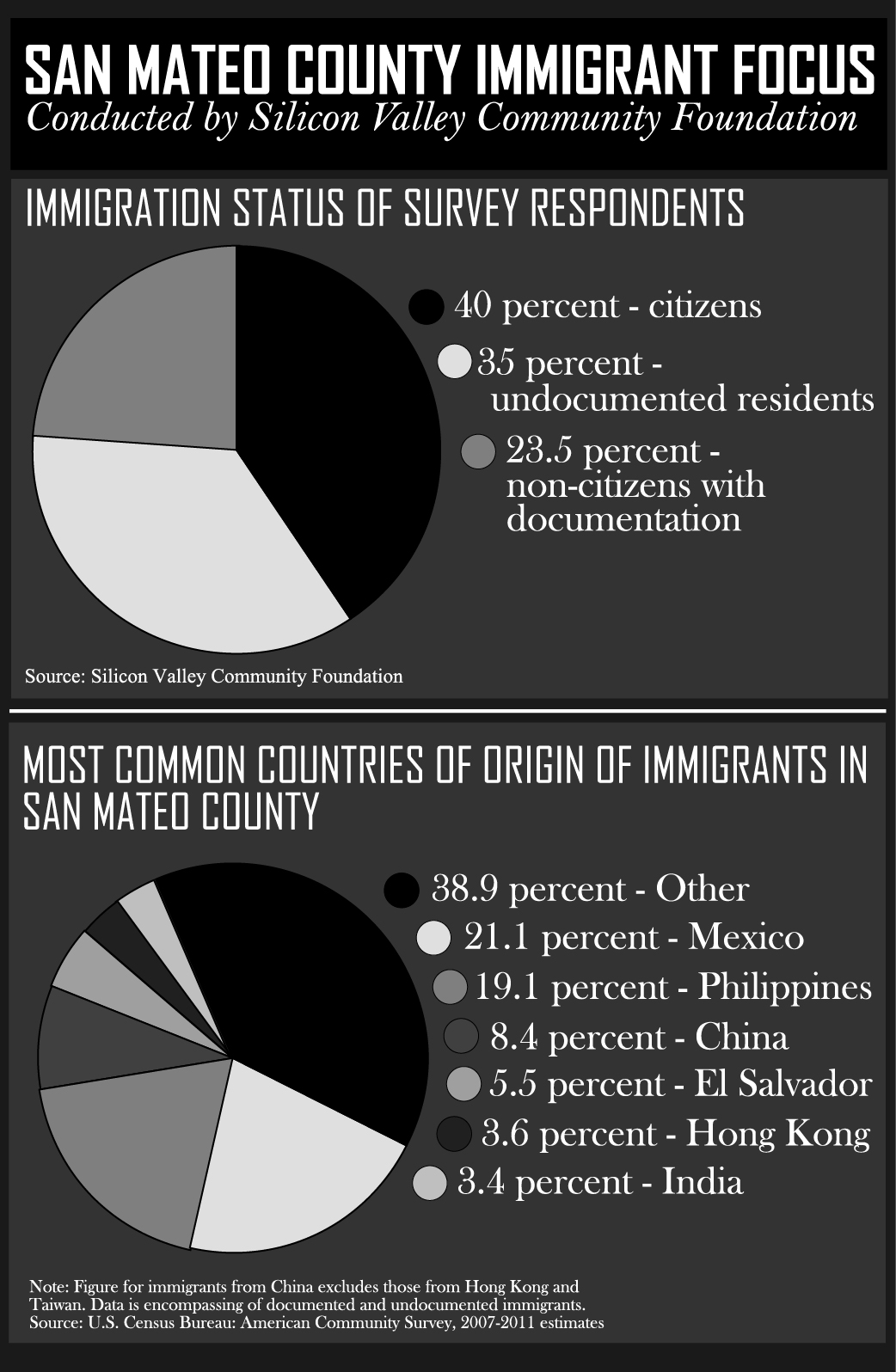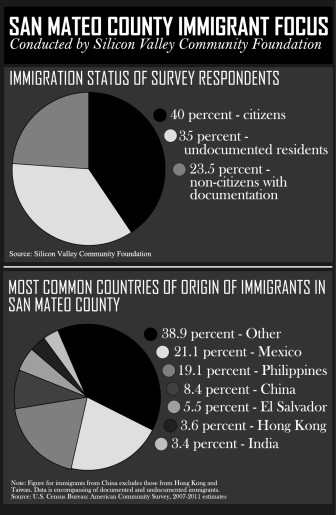
In 2005, Trevor* immigrated to the United States with his family from Tijuana, Mexico. As his father had moved to the United States a couple years after Trevor was born, the family resolved to enter the United States, among other reasons, to meet up with Trevor’s father.
Trevor recalls, “We [were] just trying to get out of Mexico because it’s really bad; it has a lot of drug problems and stuff.”
Unlike others who cross the border illegally, there were no guards or danger that impeded his family. “We walked right through the San Diego border, like straight through. There was no problem, and then we took a train to LA, and then from there it was an 8-hour drive. It was just my mom, my sister and some other guy.”
Because Trevor left Mexico at a young age, he only knew a third grade level of Spanish and little English. However, he was put in English Language Development classes in California and adjusted over time. “I was in ELD for my fourth and fifth grade, and [for] the first two weeks of middle school, I was in the ELD sort of group, but then I got moved to the regular class.”
As his English developed, he had to help translate for his family at times, especially for his mother. “I used to, not so much anymore. My dad knows English because he’s been here for a while. My mom knows more, but she’s still not quite at speaking level, but she can speak enough to get her point across so I don’t have to be there as much.”
Despite his immigration status, Trevor faced no great social problems. However, he and his family still choose to keep his status a secret, even from friends. “It’s something we [as a family] don’t really talk about, because obviously there’s legal problems that come with it. But you know, we just act normal, because other than that, people can’t tell, because there are a lot of Hispanic people around, and we all just look the same.”
He also believes that even if they did know his status, his friendships wouldn’t change. He says, “They’ve known me for a while, but they don’t know. [But], it wouldn’t change I don’t think, no.”
In the past, the real problem Trevor faced was not having a social security number. “It’s the stuff I couldn’t do, like I couldn’t get my license before and now I can get my license. Basically work and financial aid for college. We don’t get as much financial aid, but there are some scholarships that apply to us because we’re under the AB 540 category.”
The AB 540 law enables undocumented students to pay in-state tuition rather than out-of-state tuition for California colleges or universities. The law applies if students have attended a high school for three years, will graduate from high school, and will apply for US residency as soon as possible.
Currently, Trevor no longer feels as limited by his social security status. He requested the help of Aragon’s English Language Specialist, Edwin Martinez, for scholarships and other necessities like a work permit. Martinez recommended that Trevor sign up for DACA, or the Deferred Action of Child Arrivals, which allowed him to get a work permit that he now uses for his current job. He also applied for President Obama’s DREAM Act, which stands for Development, Relief, and Education for Alien Minors, where he hopes to receive more money for college.
In order to prepare for his transition to college, Trevor has taken rigorous classes and participated in sports.
Trevor attributes his drive and hard work mostly to his undocumented status. “Basically that’s the drive behind all my schoolwork. Most of us get seen under a bad light because of gangs and stuff, so I try to be set apart from that and make a difference.”
Trevor also strives to be a different example for others. “Well, personally what I’m striving to do is set an example for my sister. I’m trying to break away from the norm and basically break away from the stereotype about undocumented students and people.”
Trevor has been accepted to a prestigious higher-level institution. After college, he plans on going to graduate school where he intends to study law.

On September 16, 2005, Jackson’s* family decided to leave Michoacán, Mexico to come to the United States. “My mom said she was wanting to come to visit my older brother and he’s been here pretty much his whole life … We just want to come and visit for three months, but we’ve been here ever since,” he says.
But, Jackson’s journey across the border was anything but easy. He explains, “When you cross you do see a lot of the bodies. Some of them could be fresh and others bones.”
“I actually got separated from my family because we were caught and we split,” Jackson continues.
Although he was not completely alone, he found himself surrounded by strangers. “It was a tough time because I didn’t know any of the people there so I felt strange. Eventually they arranged a deal, and because I was only a little kid, they allowed me to go with a family that had citizenship and they passed me by saying ‘Oh, he’s my kid.’ That was scary because it was a family I didn’t know, and I didn’t know what they could possibly do to me, but luckily they were really nice people.”
At first, adjusting to life in the US posed challenges. “I was really paranoid. Any little radio triggers your mind and kinda flashes back the memory [of crossing],” he says.
When Jackson’s family moved from their initial home in Texas to California, he overcame his fear of being in America. “It took me around nine months to learn English, and I picked it up easily,” he says.
Jackson used his linguistic ability to help the rest of his family. “[My parents] don’t speak any English, and whenever they need something I have to go with them, and if it’s during school times, I have to kind of abandon school and go with them and help them.”
Aside from the language change, the cultural differences between Mexico and the United States made moving more difficult. “Religion was a big part [of life] over there, so coming here we kind of left a little behind,” Jackson explains.
In addition, the community dynamic in the United States is very different from that in Michoacán. Jackson says, “In my area where I used to live, everyone knows each other, so it’s a lot easier. If you go out late it’s no problem because there’s probably a neighbor that knows you and you can stay with them. Here you can’t because you don’t have as much freedom as you do in your home country where you know everyone.”
Despite the shift in culture and daily life that Jackson faced, he prefers to use his status as an immigrant as a source of strength. “Mr. Martinez actually gave me an article yesterday of an immigrant who is now a neurosurgeon. I try to use that to my advantage, knowing that I’m from immigrant backgrounds, but I can still push myself to do more. It’s actually possible for us to do something in this country.”
Jackson uses this knowledge when thinking about his plans for the future after high school. “I’m looking for a mechanic career because I’m into working with my hands.”
Jackson has been able to expand his options for the future by applying for benefits available to undocumented minors in the United States. “Towards the end of school [last year], I had some meetings with Immigration, and so my teachers thought it was funny because when they asked ‘Oh, where were you?’ I told them I had some meetings with immigration and they were laughing but then they were like, ‘Oh wait you’re actually serious.’”
These benefits allow him to have social security, have a working permit, and get a drivers license as well as protecting him from deportation. In the future, Jackson plans to apply for the California DREAM Act which would help provide him with residency and possibly financial aid for a state university.
*Names have been changed for privacy




